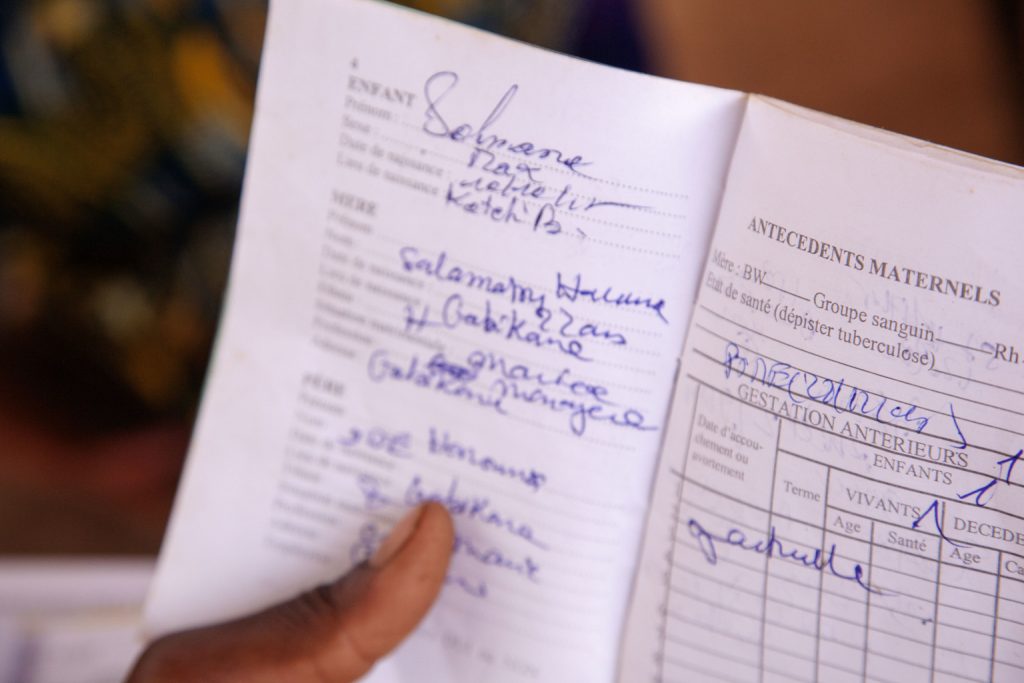Risk communication officers from the Expanded Programme on Immunization (EPI) at the national and provincial level conducted briefing sessions on the coordination and preparation of campaign activities for district chief medical officers, and provided coaching in techniques to encourage social mobilization and community engagement.
Foresight Papers
Community Mobilization and Engagement Accelerating ahead of Yellow Fever Prevention Campaign in Kinshasa
Regions
West and Central Africa
UNICEF/UN026553/Parry
A mother holds an immunization record, which is given to every child at birth so that health workers can ensure a child is receiving the necessary vaccines in a timely manner, during a polio vaccination drive in Toutou village, Dosso District, Niger, Thursday, 14 April, 2016. The majority of the population in Niger lives far from health facilities. Health outreach programs are organized in order to provide health services to people living in the most remote areas. The health workers travel to a designated locality on a specific date to perform vaccinations and prenatal checkups, with residents situated within a 17-kilometer radius informed in advance. This strategy has increased the vaccination coverage in the area, which now stands at 98%.
Niger is no longer poliovirus-infected, according to the Global Polio Eradication Initiative, but remains at high risk of outbreaks. Detection of wild poliovirus type 1 (WPV1) in 2016 in north-eastern Nigeria means the entire region is currently at risk. Niger, along with other countries of the Lake Chad sub-region, declared the outbreak to be a regional public health emergency and is implementing a regional outbreak response, coordinated with neighbouring countries.
Polio is spread through person-to-person contact. When a child is infected with wild poliovirus, the virus enters the body through the mouth and multiplies in the intestine. It is then shed into the environment through the faeces where it can spread rapidly through a community, especially in situations of poor hygiene and sanitation. If a sufficient number of children are fully immunized against polio, the virus is unable to find susceptible children to infect, and dies out.
In Niger, the majority of the population lives far from health facilities. In order to provide health services to people living in the most remote areas, health outreach programs are organized. Health workers travel to designated villages to perform vaccinations and prenatal checkups. Villa
Related content
Infographics
Key Considerations: Child Engagement in the Context of Disease Outbreaks in Eastern and Southern Africa
This infographic summarises the insights from a recent key considerations brief on child engagement in the context of disease outbreaks in Eastern and Southern Africa. This brief explores why, when and how to engage children in the prevention, response and…
Central and East Africa Hub
SSHAP
2024
Infographics
Key Considerations for Responding to Floods in South Sudan Through the Humanitarian-Peace-Development Nexus
This infographic summarises the insights from a recent key considerations brief on responding to floods in South Sudan through the lens of Humanitarian-Peace-Development (HDP) Nexus. The brief describes the multidimensional impacts of flooding on peace, health, livelihoods and governance and…
Central and East Africa Hub
SSHAP
2024
Briefing
Key Considerations: Child Engagement in the Context of Disease Outbreaks in Eastern and Southern Africa
Effective child engagement strategies are essential to optimise the response to disease outbreaks and minimise their impact while ensuring children’s protection, well-being and resilience. When children understand disease outbreaks, they are better able to cope, contribute and recover. This promotes…
Central and East Africa Hub
SSHAP
2024
Briefing
Key Considerations for Responding to Floods in South Sudan Through the Humanitarian-Peace-Development Nexus
In common with many other African countries, the Republic of South Sudan is increasingly experiencing devastating floods linked to climate change.1,2 The Indian Ocean Dipole (IOD) and El Niño regulate the climate of Equatorial Eastern Africa. In 2019, a dipole…
Central and East Africa Hub
SSHAP
2024


